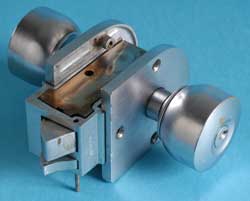
Contact
 |
MTDC Home Contact |
|---|
| Physical Security Basics |
Threat & Vulnerability Assessment |
Facility Planning |
Deterrents | Alarm Systems & Sensors |
Video
&
Access Control Systems |
|
Locks Locks are the most accepted and widely used security devices for protecting facilities, sensitive or classified materials, and property. All containers, rooms, and facilities should be locked when they are not in use. Regardless of their quality or cost, locks are considered delay devices. Some locks require considerable time and expert manipulation to open, but all locks can be defeated by force with the proper tools. Locks must never be considered as a stand-alone method of security. To maximize effectiveness and security, locking systems must be designed, selected, installed, inspected, maintained, and modified by professional locksmiths. Unfortunately, the certification requirements for professional locksmiths vary. Some States have no requirements at all. Too often, the selection of locking hardware is left up to a general contractor or builder without any input from a professional locksmith. Locksmiths are fully aware of the vulnerabilities of locks; part of their job includes knowing how to bypass locks when they are authorized to do so. Given the level of security appropriate for Forest Service facilities, it would be appropriate to engage the services of a Certified Professional Locksmith or a Certified Master Locksmith whose certification is current and has been issued based on extensive written and practical testing by the Associated Locksmiths of America, Inc. (http://www.aloa.org/). The association is an international professional organization of highly qualified security professionals engaged in consulting, sales, installation, and maintenance of locks, keys, and safes. Ensure that any locksmith you choose complies with all State regulations and laws regarding locksmiths and also is insured and bonded. |
Top Next Physical Security Toolbox Home T&D Home |